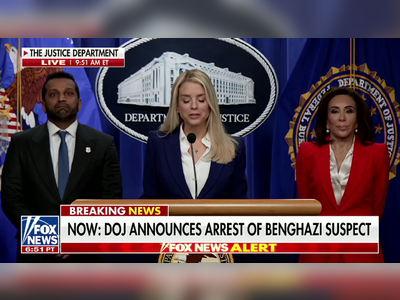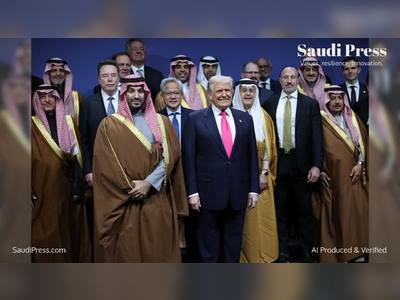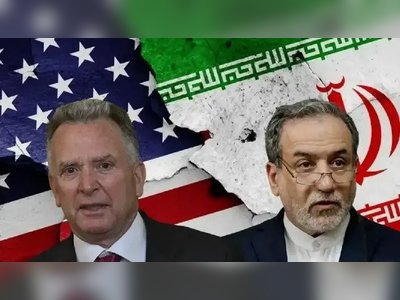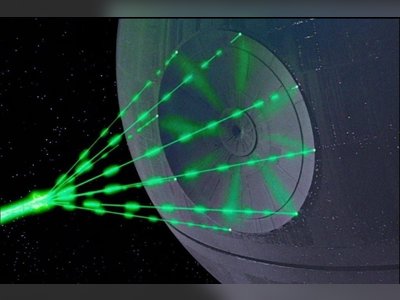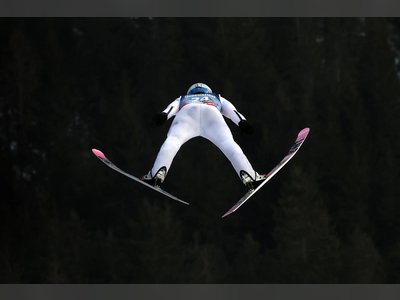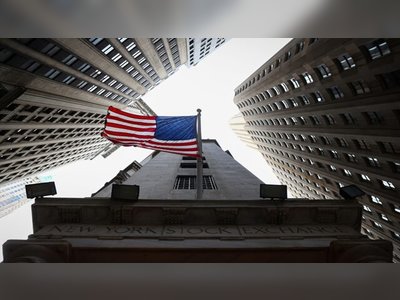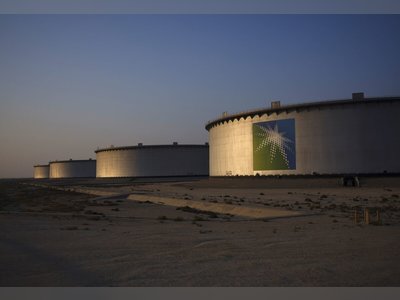0:00
0:00
Israel Tells U.S. It Killed Iranian Officer, U.S. Official Says
Israeli officials say the officer, Sayad Khodayee, was a leader of a covert unit tasked with abductions and killings of Israelis and other foreigners around the world. Iran does not acknowledge that the unit exists.
At the funeral in Tehran for a colonel in Iran’s Revolutionary Guards Corps, thousands of mourners packed the streets around the cemetery chanting “Death to Israel” and calling for revenge for his killing.
The commanders of the Guards and the Quds Force — the powerful unit within the Guards responsible for operations outside Iran’s borders — were both in attendance, hinting at the colonel’s importance.
Col. Sayad Khodayee, 50, was fatally shot outside his home on a quiet residential street in Tehran on Sunday when two gunmen on motorcycles approached his car and fired five bullets into it, according to state media. Iran has blamed Israel for the killing, which bore the hallmarks of other Israeli targeted killings of Iranians in a shadow war that has been playing out for years on land, sea, air and in cyberspace.
“We will make the enemy regret this and none of the enemy’s evil actions will go unanswered,” Gen. Hossein Salami, the commander in chief of the Revolutionary Guards, said in a speech on Monday. A member of Iran’s National Security Council, Majid Mirahmadi, said the killing was “definitely the work of Israel,” and warned that harsh revenge would follow, according to Iranian media.
A spokeswoman for the Israeli prime minister declined to comment on the killing. But according to an intelligence official briefed on the communications, Israel has informed American officials that it was behind the killing.
The United States has designated the Revolutionary Guards as a terrorist group — a decision that has been a sticking point in the negotiations with Iran to revive the 2015 nuclear deal. Iran has demanded that the designation be removed as a condition for restoring the deal, but the United States has refused, leaving the negotiations frozen.
Israel is staunchly opposed to the nuclear deal and some Iranian analysts close to the government said the attack was aimed at derailing the nuclear talks at a delicate point and undermining any possibility that Iran and the United States might reach a consensus over the issue of the Guards.
The Israelis told the Americans the killing was meant as a warning to Iran to halt the operations of a covert group within the Quds Force known as Unit 840, according to the intelligence official, who spoke on the condition of anonymity to discuss classified information. Unit 840 is tasked with abductions and assassinations of foreigners around the world, including Israeli civilians and officials, according to Israeli government, military and intelligence officials.
Israeli officials said Colonel Khodayee was the deputy commander of Unit 840, and was involved in planning cross-border plots against foreigners, including Israelis.
They said that he was in charge of the unit’s operations in the Middle East and countries neighboring Iran and had been involved over the past two years in attempted terrorist attacks against Israelis, Europeans and American civilians and government officials in Columbia, Kenya, Ethiopia, the United Arab Emirates and Cyprus.
Iran has never acknowledged the existence of Unit 840.
Iran, instead, has portrayed the colonel as a martyred hero who joined the Revolutionary Guards as a teenager, volunteered as a soldier in the Iran-Iraq war and went on to play a prominent role in the Quds force fighting the Islamic State terrorist group in Syria, a close ally of Iran.
Iranian officials have not commented on Israeli accusations that Colonel Khodayee was involved in transborder terrorism plots.
But some Iranian analysts said that the accusations were aimed at preventing the United States from agreeing to remove the Guards’ designation as a terrorist organization, and thereby block an agreement on the restoration of the nuclear agreement.
“We are also in a disinformation war with Israel,” said Gheis Ghoreishi, an analyst close to Iran’s government. “These provocations are designed to pressure all sides to call off the nuclear deal or push Iran to react in a way that would be damaging. But Iran always takes the long-term calculative approach.”
There were no indications that the colonel was well known outside of defense circles and he did not have the security protocol — bodyguards, armored car and gated housing — that is typical for senior military officials in Iran, according to two people affiliated with the Revolutionary Guards.
Iranian state media published photos it said were from the scene, showing a man they identified as Colonel Khodayee slumped behind the wheel of an Iranian-made Kia Pride, still wearing a seatbelt and bleeding from gunshot wounds.
But there were other indications that he may have been a significant figure in the Quds Force: Senior Quds Force members typically use aliases in the countries where they operate, and a Telegram channel affiliated with the Quds Force said the colonel was known in the field by the alias “Colonel Shekar,” Persian for hunter.
Two people affiliated with the Revolutionary Guards, who asked not to be identified because they were not authorized to speak publicly, gave a significantly different description of the colonel’s role from the one Israeli officials provided.
They said he was a logistical expert who played a crucial role in the transportation of drone and missile technology to fighters in Syria and the Iran-backed Hezbollah militia in Lebanon. He was also a tactical adviser to militias fighting in Syria that were trained and armed by Iran, they claimed.
The commander of the Quds Force, Gen. Esmail Ghaani, attended the colonel’s funeral in Tehran on Tuesday — a sign that he viewed the killing of a member of his force as a grave matter. General Ghaani replaced Maj. Gen. Qassim Suleimani as the Quds Force leader after General Suleimani was killed in a U.S. airstrike in January 2020.
The attack represented another serious security breach in Iran after a wave of high-profile Israeli attacks on nuclear and military targets in recent years.
Israel has a history of assassinating nuclear scientists inside Iran with drive-by shootings by gunmen on motorcycles. But while previous attacks inside Iran were mainly focused on nuclear targets and military infrastructure, this assassination appeared to be a rare instance of Israel targeting Guards members inside Iran in retaliation for plots against its citizens.
In 2020, Israel assassinated the country’s top nuclear scientist and deputy defense minister, Mohsen Fakhrizadeh, using a remote-controlled A.I. assisted robot.
The plan to target Colonel Khodayee may date back at least to July 2021. That was when operatives working for Israel’s intelligence agency abducted a farmer named Mansour Rasouli from Uromieh, Iran, according to Israeli intelligence and military officials.
The officials said that the Revolutionary Guards had recruited Mr. Rasouli, who was part of a local drug dealing gang, as a hit man for targets outside of Iran.
The officials said the agents who abducted him were seeking information about the command chain of Unit 840, which Israel says that Colonel Khodayee was a leader of. The agents released Mr. Rasouli after the interrogation, they said.
Israel leaked the story of Mr. Rasouli’s abduction to the Saudi-financed, London-based, Persian news channel Iran International in early May, according to an Israeli official. He said the leak was intended to send a message to Iran that Israel had the ability to penetrate deep into Iranian security circles.
It was also intended to warn Iran’s leaders to stop Unit 840’s operations, this official said.
In a video message posted on social media and the BBC Persian language service this month, Mr. Rasouli denied the accusations against him.
He said that a gang of men had thrown tear gas at him, tied his hands, placed a bag over his head and shoved him violently into a car and whisked him away to an undisclosed location. He also said the abductors tortured him, threatened to kill him and his family, and forced him to confess to receiving money from the Revolutionary Guards to carry out assassinations in Europe.
“I deny this,” said Mr. Rasouli in the video. “They took my phone away by force and will probably publish more pictures of me because they are capable of doing anything.”
At the time, Iranian media called the abduction “a fictional tale” and “lies.” But on Monday, the day after Col. Khodayee was killed, Iran’s state television reported that the authorities had arrested a ring of informers spying for Israel who kidnapped and extracted forced confessions from Iranians.
The commanders of the Guards and the Quds Force — the powerful unit within the Guards responsible for operations outside Iran’s borders — were both in attendance, hinting at the colonel’s importance.
Col. Sayad Khodayee, 50, was fatally shot outside his home on a quiet residential street in Tehran on Sunday when two gunmen on motorcycles approached his car and fired five bullets into it, according to state media. Iran has blamed Israel for the killing, which bore the hallmarks of other Israeli targeted killings of Iranians in a shadow war that has been playing out for years on land, sea, air and in cyberspace.
“We will make the enemy regret this and none of the enemy’s evil actions will go unanswered,” Gen. Hossein Salami, the commander in chief of the Revolutionary Guards, said in a speech on Monday. A member of Iran’s National Security Council, Majid Mirahmadi, said the killing was “definitely the work of Israel,” and warned that harsh revenge would follow, according to Iranian media.
A spokeswoman for the Israeli prime minister declined to comment on the killing. But according to an intelligence official briefed on the communications, Israel has informed American officials that it was behind the killing.
The United States has designated the Revolutionary Guards as a terrorist group — a decision that has been a sticking point in the negotiations with Iran to revive the 2015 nuclear deal. Iran has demanded that the designation be removed as a condition for restoring the deal, but the United States has refused, leaving the negotiations frozen.
Israel is staunchly opposed to the nuclear deal and some Iranian analysts close to the government said the attack was aimed at derailing the nuclear talks at a delicate point and undermining any possibility that Iran and the United States might reach a consensus over the issue of the Guards.
The Israelis told the Americans the killing was meant as a warning to Iran to halt the operations of a covert group within the Quds Force known as Unit 840, according to the intelligence official, who spoke on the condition of anonymity to discuss classified information. Unit 840 is tasked with abductions and assassinations of foreigners around the world, including Israeli civilians and officials, according to Israeli government, military and intelligence officials.
Israeli officials said Colonel Khodayee was the deputy commander of Unit 840, and was involved in planning cross-border plots against foreigners, including Israelis.
They said that he was in charge of the unit’s operations in the Middle East and countries neighboring Iran and had been involved over the past two years in attempted terrorist attacks against Israelis, Europeans and American civilians and government officials in Columbia, Kenya, Ethiopia, the United Arab Emirates and Cyprus.
Iran has never acknowledged the existence of Unit 840.
Iran, instead, has portrayed the colonel as a martyred hero who joined the Revolutionary Guards as a teenager, volunteered as a soldier in the Iran-Iraq war and went on to play a prominent role in the Quds force fighting the Islamic State terrorist group in Syria, a close ally of Iran.
Iranian officials have not commented on Israeli accusations that Colonel Khodayee was involved in transborder terrorism plots.
But some Iranian analysts said that the accusations were aimed at preventing the United States from agreeing to remove the Guards’ designation as a terrorist organization, and thereby block an agreement on the restoration of the nuclear agreement.
“We are also in a disinformation war with Israel,” said Gheis Ghoreishi, an analyst close to Iran’s government. “These provocations are designed to pressure all sides to call off the nuclear deal or push Iran to react in a way that would be damaging. But Iran always takes the long-term calculative approach.”
There were no indications that the colonel was well known outside of defense circles and he did not have the security protocol — bodyguards, armored car and gated housing — that is typical for senior military officials in Iran, according to two people affiliated with the Revolutionary Guards.
Iranian state media published photos it said were from the scene, showing a man they identified as Colonel Khodayee slumped behind the wheel of an Iranian-made Kia Pride, still wearing a seatbelt and bleeding from gunshot wounds.
But there were other indications that he may have been a significant figure in the Quds Force: Senior Quds Force members typically use aliases in the countries where they operate, and a Telegram channel affiliated with the Quds Force said the colonel was known in the field by the alias “Colonel Shekar,” Persian for hunter.
Two people affiliated with the Revolutionary Guards, who asked not to be identified because they were not authorized to speak publicly, gave a significantly different description of the colonel’s role from the one Israeli officials provided.
They said he was a logistical expert who played a crucial role in the transportation of drone and missile technology to fighters in Syria and the Iran-backed Hezbollah militia in Lebanon. He was also a tactical adviser to militias fighting in Syria that were trained and armed by Iran, they claimed.
The commander of the Quds Force, Gen. Esmail Ghaani, attended the colonel’s funeral in Tehran on Tuesday — a sign that he viewed the killing of a member of his force as a grave matter. General Ghaani replaced Maj. Gen. Qassim Suleimani as the Quds Force leader after General Suleimani was killed in a U.S. airstrike in January 2020.
The attack represented another serious security breach in Iran after a wave of high-profile Israeli attacks on nuclear and military targets in recent years.
Israel has a history of assassinating nuclear scientists inside Iran with drive-by shootings by gunmen on motorcycles. But while previous attacks inside Iran were mainly focused on nuclear targets and military infrastructure, this assassination appeared to be a rare instance of Israel targeting Guards members inside Iran in retaliation for plots against its citizens.
In 2020, Israel assassinated the country’s top nuclear scientist and deputy defense minister, Mohsen Fakhrizadeh, using a remote-controlled A.I. assisted robot.
The plan to target Colonel Khodayee may date back at least to July 2021. That was when operatives working for Israel’s intelligence agency abducted a farmer named Mansour Rasouli from Uromieh, Iran, according to Israeli intelligence and military officials.
The officials said that the Revolutionary Guards had recruited Mr. Rasouli, who was part of a local drug dealing gang, as a hit man for targets outside of Iran.
The officials said the agents who abducted him were seeking information about the command chain of Unit 840, which Israel says that Colonel Khodayee was a leader of. The agents released Mr. Rasouli after the interrogation, they said.
Israel leaked the story of Mr. Rasouli’s abduction to the Saudi-financed, London-based, Persian news channel Iran International in early May, according to an Israeli official. He said the leak was intended to send a message to Iran that Israel had the ability to penetrate deep into Iranian security circles.
It was also intended to warn Iran’s leaders to stop Unit 840’s operations, this official said.
In a video message posted on social media and the BBC Persian language service this month, Mr. Rasouli denied the accusations against him.
He said that a gang of men had thrown tear gas at him, tied his hands, placed a bag over his head and shoved him violently into a car and whisked him away to an undisclosed location. He also said the abductors tortured him, threatened to kill him and his family, and forced him to confess to receiving money from the Revolutionary Guards to carry out assassinations in Europe.
“I deny this,” said Mr. Rasouli in the video. “They took my phone away by force and will probably publish more pictures of me because they are capable of doing anything.”
At the time, Iranian media called the abduction “a fictional tale” and “lies.” But on Monday, the day after Col. Khodayee was killed, Iran’s state television reported that the authorities had arrested a ring of informers spying for Israel who kidnapped and extracted forced confessions from Iranians.
